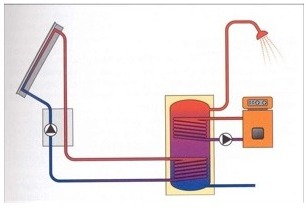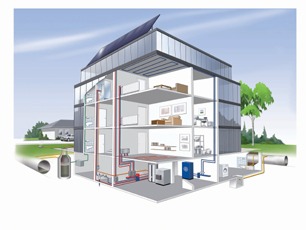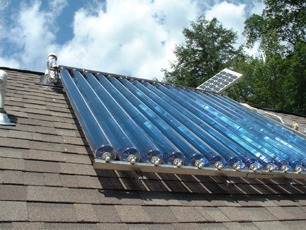|

Installation
Video
Federal and State Incentives and Credits |




|
Residential Solar Hot
Water Systems
The principles of solar hot water heating are very simple.
Collector tubes absorb the heat from the sun and transfer it to the water or other liquid flowing through the tubes, in the same way that water in a garden hose will heat up if left lying in the sun.
Let's look at the components of your hot water system and how they work.
Your system is made up of:
Solar Collectors
A well insulated storage tank with a heat exchanger
Regusol unit: A circulating pump and control unit
Depending on the size of your family and your particular hot water requirements, you will need either one or two solar collectors.
How Your System Works
In a conventional water heating system, cold water (approximately 50 - 60 degrees Fahrenheit) is fed from the city supply or your well into the gas or electric water heating system where it is heated to a comfortable level of about 130 degrees Fahrenheit. This takes a lot of energy. With your solar hot water system, cold water is fed into your solar storage tank. The pump circulates a non-freeze fluid through the solar collectors where it is heated by the sun. The heated fluid is pumped back through the heat exchanger in the storage tank where the heat is transferred to the water. The Regusol unit continually monitors the temperature of the fluid in the collectors and the temperature in the tank. If the fluid in the collectors is significantly warmer than the water in the tank, the pump circulates the fluid through the collectors. The Regusol switches off automatically when there is insufficient sunlight and the collectors are no longer able to raise the temperature of the water in the storage tank. This happens when the sun is at a very low angle or when there is a thick cloud cover, and at night. The pump automatically starts again when enough sunlight is available. Temperatures in your solar storage tank can be as high as 120 degrees F in winter and 150 degrees F in the summer months. When you turn on a hot water faucet in your home, your water requires very little or no heating to reach your required temperatures. Your solar hot water system s used n conjunction with your existing water heating system, or a specially installed electric/solar water heater. This system provides the additional heat required to bring your solar-heated water up to your desired temperature. It also copes with increased demand during prolonged cloudy weather or when you have visitors in your home.
HOW YOU BENEFIT FROM YOUR
SYSTEM
Heating water in your home is one of the most energy consuming demands you have. The cost to heat water in your home is likely to be
25 - 30% of your total energy costs; it will be higher if you have more than four people in your home. This may mean that almost half of your electric bill, or more than 40% of your gas or oil bill, will go towards your domestic hot water costs. Solar water heating is the easiest, most straight-forward way to use the sun to save both energy and money. A residential solar hot water system will reduce the energy you require to heat your hot water anywhere from 60 to 80%.
Generous Federal Tax Credit
Your solar hot water system is eligible for a Federal Tax Credit of 30% of the installed cost of the system, up to a maximum of $2,000. This will substantially increase the return on your investment in the system.
Your Investment
Your system is a long-term investment that will provide
Free hot water, or greatly reduced utility bills, saving you $100s annually this can be even more significant if your utility company has a tiered rate structure, charging more at higher levels of usage.
Protection against increased energy prices once installed your system will be producing all or some of your hot water at no cost.
The use of clean, non-polluting renewable energy it is estimated that, over a 20 year period, a solar hot water system that replaces an electric system will avoid 50 tons of carbon dioxide emissions. Carbon dioxide traps heat, contributing to the global warming. You are contributing to the reduced dependence on fossil fuels.
|
 Residential Solar
Residential Solar
 Residential Solar
Residential Solar